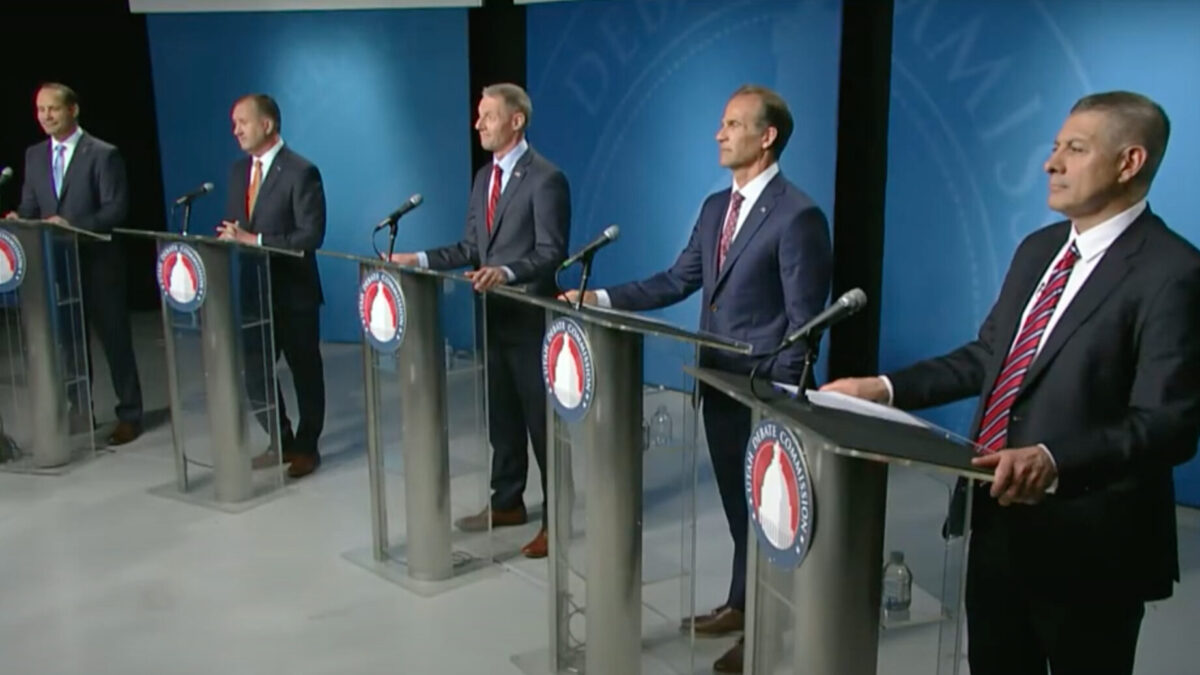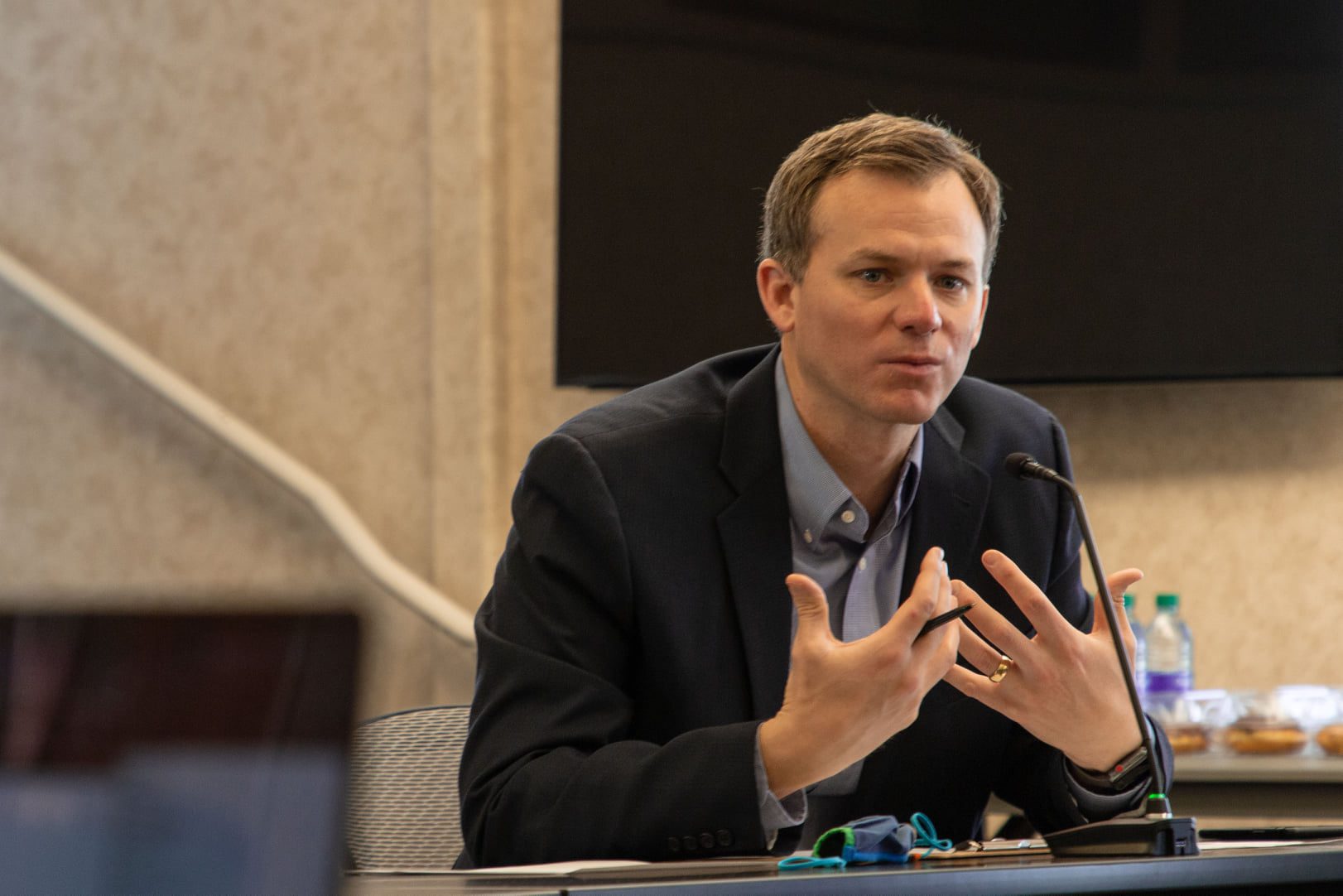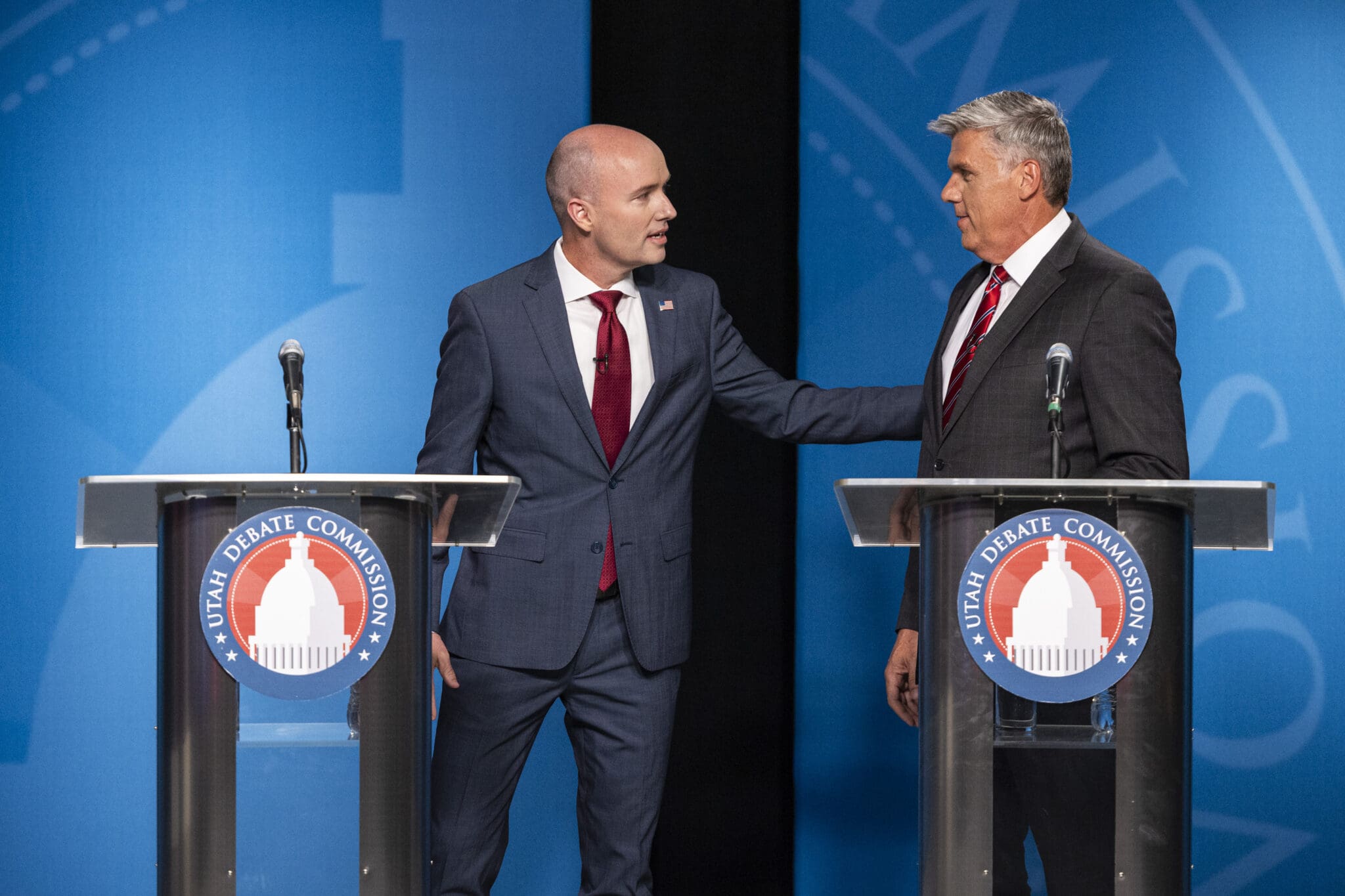Politics
Utah’s 3rd Congressional District candidates face-off in debate

Photo: Candidates for Utah’s 3rd Congressional District on the Debate Stage. From Left to right, J.R. Bird, John Dougall, Mike Kennedy, Case Lawrence, and Stewart Peay. Photo: Utah Debate Commission.
SALT LAKE CITY – Republican candidates competing for Utah’s 3rd District Congressional seat engaged in a debate on Wednesday evening, attempting to distinguish themselves within a crowded field of GOP candidates.
Utah’s 3rd Congressional District includes parts of Summit County and all of Wasatch County.
Participants of the debate include Utah County businessman Case Lawrence; military veteran and former Utah County Republican Party Chairman Stewart Peay; State Senator Mike Kennedy; Roosevelt Mayor J.R. Bird; and Utah Auditor John Dougall.
The contest for the House of Representatives seat is wide open since the incumbent, Rep. John Curtis, is stepping down this year to vie for Utah’s available Senate seat.
The one-hour debate hosted by the Utah Debate Commission and moderated by Thomas Wright, CEO and principal broker of Summit Sotheby’s international realty, focused on a wide range of subjects, including foreign aid to Ukraine, abortion, and the federal government’s budget deficits.
While all candidates agreed on a host of different subjects, a stark point of contrast between the five men was in relation to foreign military aid, specifically aid to Ukraine.
All candidates emphasized one of the biggest problems facing the U.S. today is the ballooning national debt. When asked how they would specifically cut federal spending if elected to the House, each candidate provided a different answer.
Dougall, whose campaign largely focuses on establishing a balanced budget on the federal level, said he would target the U.S. Department of Education to reduce government spending and decrease national debt.
Kennedy, a practicing doctor in Utah, articulated on his experiences growing up in poverty taught him how to control money properly. He also explained that his professional career as a medical doctor has opened his eyes to Medicare and Medicaid programs being “rife with fraud and waste.” If elected, Kennedy also mentioned he would vote No on large omnibus bills without reading them thoroughly.
Emphasizing his business background, Lawrence believes his experience in the business world would translate over well to budgeting on the government level. If elected, Lawrence would focus on cutting funding for “unproven green climate schemes.”
Arguing that members of Congress are indifferent to the effects of inflation and increased levels of government spending, Peay explains that he”would cut transportation and send it back to the states” to help reach a balanced budget.
Lastly, Bird contended that his experiences as a Mayor and a business owner has taught him how to budget effectively. If elected, Bird said he would introduce legislation that would handcuff Congress until a balanced budget was reached. He also mentioned he would target “mandatory federal welfare spending.”
Switching topics to abortion, all candidates argued that abortion laws should be determined on the state level.
Kennedy affirmed his position as pro-life, “I’m a pro-life person. I’m a pro-life professional. I’m a pro-life legislator. I’ve got a 100% pro-life record as I’ve worked through the state legislature and I believe Utah does it right,” Kennedy said.
Kennedy argued that states should support women in making the choice to have a child, and if not, help support and facilitate adoption.
Lawrence, in agreement with Kennedy, described himself as “strongly and unequivocally pro life.” Lawrence also supports allowing individual states to determine their own abortion policies, yet would consider a federal ban for states partaking in “abortion tourism.”
“Extreme abortion states, who are marketing and encouraging abortion tourism throughout our country, who are recruiting women for any kind of abortion at any stage of pregnancy, and to me, that is when to consider a federal ban,” Lawrence said.
Agreeing with both Lawrence and Kennedy, Peay also described himself as “strongly pro-life.” Besides exceptions such as rape, incest, or a life-threatening pregnancy, Peay believes that abortion should not happen at all, likening a federal ban on abortion to an overreach and a “growing federal footprint in our state.”
Candidate Bird mentioned that he does not agree with “abortion being a form of contraception,” while also recognizing cases where abortions are necessary. Bird also supports states determining their own abortion policies. “I’m grateful that Roe vs. Wade was overturned and that that decision went back to the states. I feel like Utah does a great job with the abortion issue, and I think at this moment in time, it needs to be left with the states,” Bird said.
In accordance with all other candidates, Mr Dougall agreed abortion should be determined on the state level, while also adding that a federal policy would be harmful to the pro-life cause. “A Supreme Court ruling returned it back to the states and to the people. I think those that are continuing to push it at the federal level will ultimately end up with the California style, pro-abortion planning and policies. We should fight that and we should keep it at the same level,” Dougall said.
Where the five candidates disagreed upon the most in terms of policy related to foreign policy, specifically if the U.S. should continue to support and aid Ukraine in its war against Russia.
Agreeing with continued support to Ukraine is Peay, a 12-year military veteran believes that a lack of support would demonstrate American weakness on the global stage.
Describing American adversaries Russia, China, Iran, and North Korea as an “evil block.” “If we don’t do that (support Ukraine) the Chinese and the Iranians will see the weakness and they will take advantage of it. Places like Taiwan in the Middle East will grow worse,” Peay said.
Asked if he would have supported the latest aid package to Ukraine, Bird said he would have voted No, arguing that “we’ve been in a quagmire for two years we’ve sent hundreds of billions of dollars to Ukraine for funding and we’re not moving the needle.” Despite this, Bird would advocate to further sanction Russia economically and begin exporting natural gas to reduce Europe’s dependency on Russia.
Dougall also said that he would have voted No on the latest package, yet agreed with supporting Ukraine saying he would rather send “bullets, not boys.” Dougall also is in favor of strengthening the military in case of potential conflicts with China or Russia.
Kennedy did not say how he would have voted on the recent aid package, yet believes the Ukrainian-Russian war is due to weak leadership from President Biden. Kennedy believes Biden is “asleep at the switch,” but also mentioned that the U.S. “cannot be the police officer of the whole world, we don’t have the money to do all of this.”
Lawrence said he would have supported the latest aid package. “We need strength and deterrence on the world stage, a strong American presence. Part of that formula for a strong American presence is supporting our allies abroad.”


















